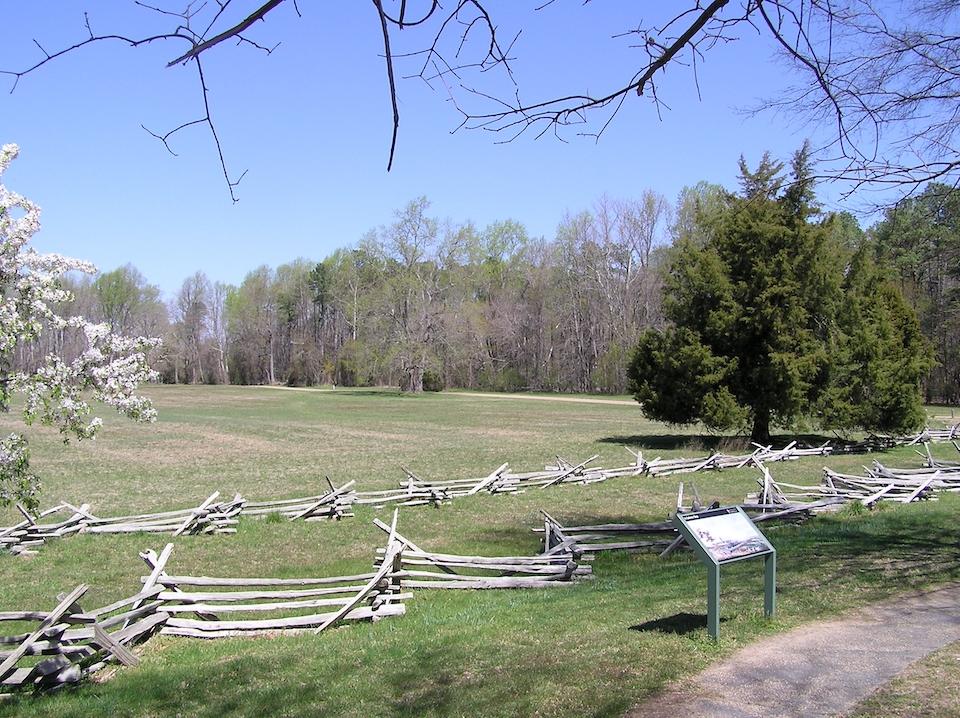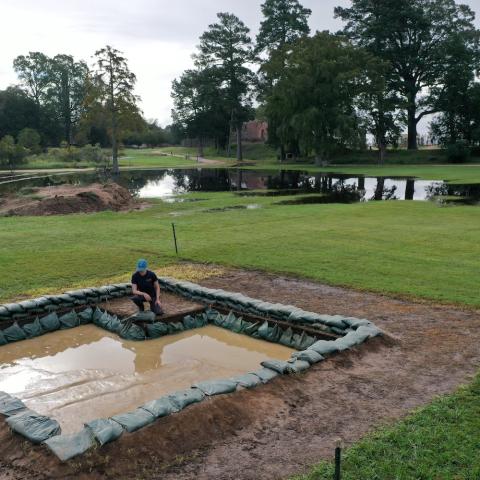
A filmmaker shooting in Colonial National Historical Park was practicing his First Amendment rights and didn't need a permit, a judge has ruled.
Editor's note: This updates with National Park Service reaction.
A federal judge has struck down as unconstitutional the National Park Service's practice of charging commercial filmmakers who want to shoot in the National Park System, ruling it is a protected activity under the First Amendment.
The ruling (attached below) by U.S. District Judge Colleen Killar-Kotelly stated that the permitting practice, through which the Park Service charged commercial filmmakers for a permit and any costs relating to park personnel assigned to monitor the filming or other cost recovery, "is an unconstitutional restriction on speech protected by the First Amendment."
"The statute imposes a chilling effect on the expressive activities of a wide swath of national park visitors," wrote the judge in her ruling Friday. "Consequently, there is a significant equitable interest in avoiding the unconstitutional application and enforcement of (the requirement) and its implementing regulations."
Congress in 2000 directed the secretaries of Interior and Agriculture "to require a permit and establish a reasonable fee for commercial filming activities or similar projects, as well as certain still photography activities, on federal lands under their respective jurisdictions. The law also directed the Secretaries to recover costs incurred by the agencies as a result of the permitted activity. Fees collected under this authority are to provide a fair return to the United States; be based, at a minimum, on certain listed criteria; and be retained by the Agencies to be available to the Secretary without further appropriation to be used consistent with the formula and purposes established for the Recreational Fee Demonstration Program."
The case was brought by Gordon M. Price, a Yorktown, Virginia, filmmaker who filmed settings in Colonial National Historical Park in Virginia for an independent feature called Crawford Road. The film revolved around "a stretch of road in York County, Virginia, that has long been the subject of rumors of hauntings and was the location of unsolved murders.”
Price, who didn't obtain a permit for filming in the park, debuted the production in October 2018 before an audience of about 250.
"The film garnered some attention in the local press and on social media sites," the judge noted in her ruling. "In December 2018, however, two NPS officers located Mr. Price at work and 'issued him a violation notice for failure to obtain a commercial filming permit.'"
In challenging the permitting requirement, Price pointed out that it does not apply to non-commercial filming, nor does it apply to news organizations. The absurdity of differentiating on the basis of whether a production was commercial didn't escape Judge Killar-Kotelly.
"For example, a 'non-commercial' filming production carried out by a non-profit organization or a news crew would escape the reach of (the) permitting regime, even if those groups used heavy filming equipment that damaged federal land," she wrote.
The permitting language carried no differentiation between large film crews with heavy equipment and small crews with no heavy equipment; Price used a single tripod with a camera and no more than four people.
"Defendants offer no explanation for how the broad sweep of this permitting regime is sufficiently tailored to the government’s goal of protecting federal land," noted the judge.
Judge Killar-Kotelly, in agreeing with Price, pointed out that the U.S. Supreme Court long has recognized film as being protected under the First Amendment, and that the high court "has found that 'the creation and dissemination of information are speech within the meaning of the First Amendment.'"
Taken in total, Price's "filmmaking at these parks constitutes a form of expressive speech protected by the First Amendment," she ruled.
In Washington, National Park Service officials were reviewing the judge's ruling "and determing the next steps," said Jenny Anzelmo-Sarles, the agency's chief of public affairs and chief spokesperson.
“This case started when the Park Service tried to criminally cite Gordon Price for unobtrusively making a film in a public park,” Price's attorney, Robert Corn-Revere, told the National Press Photographers Association. “But Gordon fought for his rights and prevailed. The court’s decision reaffirms that the act of filmmaking is protected by the First Amendment, and that the government cannot condition this right with arbitrary permit and fee requirements.”
The ruling did not apply to commercial still photography, however, as Price did not challenge that aspect of the Park Service permitting requirements.
In citing the permitting language applying to the Park Service's ability to recoup costs for damages inflicted during filming, the judge pointed out that "(W)hile the government and the public do have an interest in preserving federal lands, such an interest does not justify a widely over-inclusive law that infringes upon free expression. ...
"Moreover, the National Park Service has also shown itself capable of enacting regulations that preserve park resources without overly burdening expressive activity, and may continue to do so in ways that do not run afoul of the First Amendment," she held.


 Support Essential Coverage of Essential Places
Support Essential Coverage of Essential Places







Comments
It's always a funny thing about police forces and, frankly, people in authority in general. You usually like them when they're protecting and preserving what, if anything in some cases, you feel entitled to want protected and preserved and you usually like them to be strictly enforcing the rules in those cases. And, you usually like them when they're letting you, with little to no interference whatsoever, do what you feel entitled to do, even in cases where what you want to do might impact what people who are less like you want protected and preserved. But, it's always hard to establish fair and equitable boundaries between what you may or may not have been raised to respect and what the next person was taught to see as their freedoms, liberties, and entitled privileges. Personally, I've been forced back to the point of just wanting the rules to be enforced rationally and, most important, consistently, although even that seems too hard a goal.
Thank you, Protection Ranger, for saying what the majority of us in the service know to be fact. And, as you say, if it's mentioned in any way, one is immediately put into the catagory of being anti law enforcement. Gone are the days of being a Ranger to help the public. It's now the days of "Ranger Brute".
Under the permit law of the NPS, a person filming with an iPhone would need a permit if the video from that iPhone resulted in any income to the photographer. I've been keeping track of this issue for over a decade and the 2000 law from Congress was completely ridiculous and ignored the advances in video cameras like iPhones and DSLR cameras. Under the rules of the NPS, if you were shooting with a Canon or Panasonic DSLR and pressed the shutter for a photograph, no permit is required (commercial or non-commercial use). If you pressed the button to record video, then you need a permit! Or if you take some video of your camping trip with your iPhoee and use it to promote a local camping store's business, you need a permit.
America has some of the most restrictive and punitive laws when it comes to filming on public lands. Other developed nations in the world have no such laws. This doesn't mean if Steven Spielberg shows up with a 500 person crew in Yosemite Valley that he shouldn't have to pay a fee to the NPS to film his next mega-film. But putting the person like this guy in the same category as a Hollywood studio production is just wrong.
I'm glad the judge struck down this unconstitutional law.
The fee schedule from the NPS does vary on the size of the filming crew and equipment. I believe that filming with just a tripod by yourself does not require a fee to be paid. HOWEVER, the NPS requires a minimum $1,000,000 liability insurance coverage from the filmmaker! So the other issue is the OTHER "fees" that are required by the NPS. There are more than one fee involved with the current rules. I wanted to shoot some "B-Roll" at a National Historic Site. Fine, I could do it without paying a fee since it would've been just me and my camera. However, I still would have been required to buy liability insurance which even for the bare bones policy for an independent filmmaker would cost a thousand or more dollars.
Because of incidents like this and other issues, I won't visit any National Park. It's just not worth it since when you enter a Park, you are subject to even more rules, regulations and laws than when you weren't on Federal Lands. I read a story years ago about the criminal justice system at Yosemite. It seems that even getting arrested there lands you in a different place than if you were arrested in Springfield, Anywhere Else, USA. Don't mess with the FEDS is not a joke anymore.
And please, before you flame me, I've probably picked up more trash on trails than most people. I never cut switchbacks, I don't sit in lawn chairs in meadows and I bear-proof every item that has a scent. I don't drink alcohol or play loud music or have a generator.
Working in the film industry, it is normal and expected to reimburse locations for attendants to a film project, road closures, encroachment permits, etc. This is specifically about CHARGING for a film permit vs not charging. Any expenses would be reimbursed, but to be paying a fee just for the act of filming somthing considered commercial - no matter how obstrusive or disruptive - vs a news crew or non-commercial (a definition very hard to capture in this circumstance) is the issue. There can be notifications required, without the fees, and any measures taken to mitigate the potential for problems. This is accepted and expected.
People here are always talking about "Hollywood can now just trample through and tear everything up without paying a fee" but they forget the Independent filmmaker who likes to make movies. You know little guys like Kevin Smith and Robert Rodriguez who started with micro budgets and made it to the big time. Fees and permits are ways to gatekeep people from being able to actually getting their visions and voices heard. My budgets are as thin as possible when I make a movie. Thank goodness I live in a state that doesn't require permits to film, and most of the cities I film in don't require them either.
But you know, it isn't like the people filming aren't taxpayers, who already pay taxes for the part, paid to enter, paid for parking (if applicable), and are just trying to do what they enjoy just like the rest of everyone there. They still have to follow the rules like not filming people who are not in the film, which goes everywhere, not just in parks.
The laws being applied here are considerable when comparing this idea to a major motion picture vs a private party creating content for a small audience, at that point these productions bring in $100-1000 dollars depending on viewership and if that party is even monetizing the video to make profit. Overall, there should never be an infringement such as this that blocks taxpayers from being able to express themselves in press and film, as well as speech. But also, yes there should be restrictions on major motion pictures or film industry so they must be required to pay a fee to utilize these lands for filming while also following strict land guidelines for preservation. Protect the 1st amendment, this law is dumb asf.